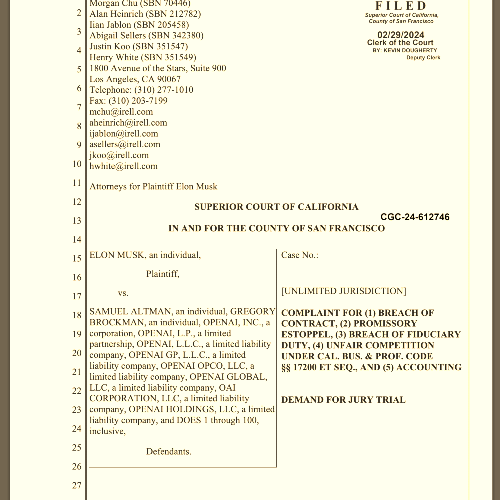Popcorn Time: the Musk Open AI Lawsuit

Today, Elon Musk filed a lawsuit against Sam Altman, Gregory Brockman, OpenAI Inc., OpenAI LP, OpenAI LLC, Opean AI GP LLC, OPEN AI Global LLC, OAI Corporation, LLC, and Open AI Holdings LLC. The number of corporate entities involved is also a point of interest for the public in forming public opinion on how they conduct and continue to conduct business. The partners of those businesses have yet to be made fully transparent but soon must because of another bombshell legal entry in 2024, the Corporate Transparency Act. This landmark litigation will impact not only the ability of Open AI to conduct business the way it has been but also the future competitive landscape for AI innovation.
I've prepared a big batch of popcorn to watch this one from the sidelines. It's a white knuckler, peeps.
Finally, things are starting to get interesting around here. For a while, I have had the strangest, most dizzy feeling that I equate to the release of the Pentagon Papers. While I was not born when that leak happened, I imagine a national vertigo for those who read it and understood the contents. Whereas before the release, we might have suspected national lying at an enormous scale, here we had in print the evidence that this was true. It feels a little like a movie or fiction that we inhabit in these movies as we are forced to revisit in flashback what we think we know.
In one of Shakespeare's comedies, a mistaken identity leads the court fool to say:
No, I do not know you, nor I am not sent to you by my lady, to bid you come speak with her, nor your name is not Master Cesario, nor this is not my nose neither. Nothing that is so is so.
Or in Hamlet, the Prince says:
Nothing is either good or bad, but thinking makes it so.
Interestingly, many people quote this last one to talk about detachment. Eckhart Tolle famously uses it to inform people that the path to peace is to stop judging things as good or bad. Some use it to justify moral relativism. But the original intent is Hamlet talking to his traitorous best friends (Rosencrantz and Guildenstern), who have taken money from the throne to spy on Hamlet on their behalf. He is commenting on their rudderless existence as friends for sale rather than people who have distorted reality through their opportunistic (and some might say cowardly) dissembling.
Deception does not only distort the reality the deceiver is attempting to conceal. It distorts and impacts the ability of everyone in its radius to know what is true and what is not. It's a radioactive atomic bomb.
So, feeling vertiginous in the radius of Open AI, a nonprofit to benefit the public that almost immediately betrayed that trust, became private, "accidentally" leaked it to a foreign power, and then allowed it to be weaponized.
The legal principles at hand are:
1. Breach of Contract
2. Promissory Estoppel
3. Breach of Fiduciary Duty
4. Unfair Competition
5. Demand for an Accounting and Jury Trial
Number 5 appears to be interesting. One of the things that would expose not just the business problems but also the technological issues with the software would be how data weighting and normalization were conducted. This has been long overdue for a full airing, as we know that at least some data was outsourced to Kenya with questionable humanitarian conditions
This is not explicit in the lawsuit, per se. It would depend upon the remedial actions recommended upon conviction based on the plaintiff's claimed injury. However, in theory, this could lead to a whole host of other class action civil suits.
A ruling entirely in Musk's favor will lead to significant governance, operations, and development changes. It will almost certainly lead to increased transparency and fiduciary responsibilities. I will be watching this one closely.
Anyone who understands tech knows what is legitimate innovation and where the grift is. If they tell you there is no grift, they lie, including the feigned awe many figures have about its capacity. Many things about GPT have proven their salt. Still, those things are far more modest, represent incremental advances over existing technology, and rely in large part on access to privileged data. Many more of the facets of GPT make massive infrastructure investments at this time unwise. But I suppose.
Worth a gamble? If that's what you are into.
More soon on this, I'm sure. In the meantime, friends.
Stay curious.
JP




